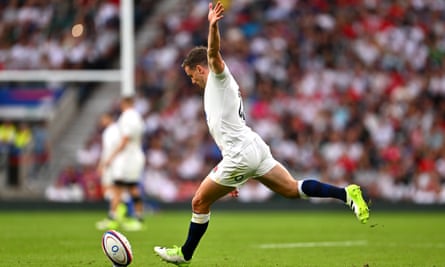A relieving, bonkers win for a depleted England, but one that came at a major cost. A red card for their captain, Owen Farrell, has placed the fly-half’s participation in the opening pool fixture against Argentina in Marseille next month under a major cloud and his head coach, Steve Borthwick, may now have to change both his fly-half and his captain.
Farrell was shown a yellow card for a shoulder to the head of the Welsh replacement Taine Basham which was subsequently upgraded to a red card by the television match official. England’s skipper could have few complaints and, given his previous disciplinary history, may struggle to find much sympathy at his hearing in the coming days.
Less than four weeks before the World Cup’s opening game, furthermore, the Leicester scrum-half Jack van Poortvliet also appears to be a major doubt after he was carried off in obvious discomfort in the first half with an apparent injury to his lower right leg. It did not look at all good and England’s management face an anxious wait on that front.
Despite it all, a 14-man England still somehow managed to clinch victory late on courtesy of a late close-range try from Maro Itoje and a penalty and conversion from George Ford. For all the late drama, though, this was not an 80 minutes to encourage England or Wales supporters that a life-enhancing autumn lies awaits them French soil.
Never mind the respective merits of Barbie and Oppenheimer, this was frequently a Saturday-night horror show from multiple perspectives. Had England lost, as seemed likely when Farrell’s yellow card was upgraded to a red in the final quarter, they would have sunk to ninth in World Rugby’s rankings, below Australia, Argentina and Wales.
They avoided that fate but, until their backs were right up against the wall, this was often another head-scratching afternoon.
These are bizarre days for English rugby union all round. Hope and glory? The latter has been in short supply for some time and stocks of the former have also been dwindling. The pre-match talk had all been about England making some kind of positive statement. Beyond the result, there was also a clear need to re-engage a few more hearts and minds. Back in the day England either won or lost but the patrons were still guaranteed to turn up in optimistic droves. Now the sporting marketplace is more crowded and choices less binary. People were watching the Lionesses in the pubs of Twickenham and there were even Hull KR shirts visible in Richmond High Street.

Entertainment-wise, the Ashes series has also set a high bar for Borthwick’s squad to clear.
It did not help in promotional terms, then, that a printing error required all the match programmes to be scrapped. It left many of those in attendance with no option but to sit back and wait for someone in red or white to catch the eye.
No one could rise to the challenge in the opening 40 minutes, with the game unfolding along largely generic lines. England were overwhelmingly structured and playing the percentages, Wales occasionally prepared to think outside the box and not just kick down Freddie Steward’s throat. A breezy afternoon added a further slight degree of uncertainty, although Elliot Daly could not entirely use that as an excuse when a misjudged early kick rolled too long.
Eventually, the visitors began to enjoy some territorial joy courtesy of a jarring tackle by Dewi Lake on Steward that delivered a significant turnover. Wales could not take advantage, with an attacking maul collapsing just short, but it gave their confidence a small boost. England, for the second successive week, were guilty of coughing the ball up in contact too often.
after newsletter promotion
With the Welsh lineout also spluttering, Farrell’s straightforward 10th-minute penalty was to prove the only score in a first half-hour otherwise most notable for the premature departure of an injured Lake, the second successive game in which Wales had to make an enforced early hooker change. With Henry Arundell sent to the sin-bin for not retreating after Liam Williams had claimed a mark, a 14-man England could add only a second Farrell penalty before the half-time whistle brought some temporary respite for all.
Could England crank things up a gear or three? It should have helped considerably when Tommy Reffell was also sent to the sin-bin at a ruck less than a minute into the second-half after the Georgian referee, Nika Amashukeli, decided that a rash of first-half Wales offences should not cease to matter simply because of a 15-minute dressing-room hiatus.
Quick GuideHow do I sign up for sport breaking news alerts?
Show
- Download the Guardian app from the iOS App Store on iPhone or the Google Play store on Android by searching for 'The Guardian'.
- If you already have the Guardian app, make sure you’re on the most recent version.
- In the Guardian app, tap the Menu button at the bottom right, then go to Settings (the gear icon), then Notifications.
- Turn on sport notifications.
Instead it proved to be a red herring. Ellis Genge, on the occasion of his 50th cap, was sent to the sin-bin within a couple of minutes of coming on and, from that moment, the hosts unravelled. Steward, unluckily sent off against Ireland in Dublin in March, was a touch fortunate to see only yellow for taking out Josh Adams in the air wide on the left and Wales were subsequently awarded a penalty try.
Then calamity for England. Video replays showed Farrell clattering Taine Basham in the head with a braced shoulder and off went the red rose captain, too. Against 12 men, surely Wales would take advantage? They duly did so, Joe Roberts bursting clear and feeding Tomos Williams for a gallop to the posts. England did rally for their first try of the August series through Itoje but Farrell’s red card has turned their World Cup preparations upside down.